- Home
- Rae Carson
Like a River Glorious Page 22
Like a River Glorious Read online
Page 22
The boiled oats and molasses I ate for breakfast churn in my belly. I breathe deep through my nose, afraid of what might happen if I vomit up my meal all over my new clothes.
“I’d appreciate it if you put on the new boots,” he says.
“Right now?” I practically squeak.
“Now,” he says firmly. “To check their fit.”
“All right,” I manage. Keeping one eye on him, I bend down to unlace Daddy’s boots. They make my feet look huge, but they’re his, and they’ve held up through miles of mud and rock, of sun and rain, of happiness and heartbreak.
I give a quick thought to the small bag of gold shoved down inside the toe of one, but I doubt Uncle Hiram will think to check, and I plan on putting these boots back on at my soonest opportunity.
Reluctantly, I slide them from my feet. Uncle Hiram’s eyes are wide as I slip on the new ones, with mania or fever or something I don’t quite understand. He is not my father. He’s not.
I lace them up and stand. They feel funny on my feet—pinched and tiny and fragile. “Perfect fit,” I say with a forced smile. “Thank you.”
He beams. “You’re welcome.” He stands and circles the table to get a better view. “They are lovely on you.”
Then, faster than a swooping hawk, he scoops up Daddy’s boots from the floor where I left them.
“What are you doing?” I demand.
“You don’t need these anymore.”
“Of course I do. All the mud and—”
He opens the door to the box stove and thrusts them inside, slams the door shut, latches it.
“No!” I reach for the stove, but he blocks me, batting my hands away. “Daddy?” I whisper. I try once more to lunge past him, but Hiram grabs me by the throat and shoves me away. I collide with the table, scooting it back several inches.
While I struggle to rise, he stands sentry before the stove, arms crossed, face resolute. “You’ll wear the other boots I gave you, the ones you ruined, when you visit the mine. These you will save for special occasions.”
I should say something back, but if I open my mouth, all that will come out is a scream.
“Leah, never mention Reuben again, do you hear me? Never.”
I give up trying to stand and fall to my knees instead, sobs quaking in my chest, tears free falling down my cheeks. Grief is a whipping whirlwind inside me, like gold gone sour. Because my daddy was the best person I knew, and I’ve lost him all over again.
Something pops inside the stove. Burning leather has a peculiar smell, different from wood.
A minute passes. Two. Then Hiram’s footsteps stomp across the room and he slams the door as he leaves.
I jump up and use the tongs to pull Daddy’s ruined boots from the stove. They’re stiff and shrunken and blackened, the edges crumbled to ash. I leave a nasty soot mark on the table when I set them down, but I’ll worry about that later.
I allow them to cool awhile, then carefully peel back the charred leather tongue and find what I’m looking for, still lodged in the toe. Some of the tiny nuggets stick to one another, the result of impurities melting a little, but the gold is intact. I upend the boot and shake the gold out onto a napkin, but my sense tells me there’s still some stuck inside, so I take a finger and sweep around until I’ve recovered every possible speck.
My finger smarts from the still too-hot leather as I ponder a moment. If I save these boots, my uncle—I refuse to think on him as my father—will find them and throw them away again. So I can’t hide the gold inside them. Maybe the best place is the box stove, after all. It’s rare for a fire to get hot enough to melt gold.
Then again, I don’t know how often the stove is cleaned out. And what if I need to grab the gold fast, someday soon? There’ll be no time to let it cool, no way to carry what would amount to a burning coal.
Under my mattress will have to do for a hiding place again, though I wouldn’t put it past Hiram to search my bedroom on occasion. Inside the mattress would be better, but I’ve no knife to cut with. Hiram has been careful—there is not a single knife in this cabin that I can see, not even to cut food. He tidies up his desk and takes his letter opener with him every time he leaves.
But maybe not this time. I upset him quite a bit.
My gaze falls upon Hiram’s writing desk. I dash toward it and fling open the single drawer. Sure enough, a bronze letter opener gleams at me from inside. The handle is shaped like a sword hilt, so that it looks like a tiny dagger. I grab it and run my finger down its length.
A tiny, dull dagger. But it’s hard and pointy, and I bet I can make do.
I run to my bedroom, fling off the quilt, and lift the mattress. I stab into the ticking with the letter opener, then poke my finger into the hole and pull and yank until it’s large enough for my napkin-wrapped gold.
I work the tiny bundle through the hole, then smooth out the fabric as best I can before letting the mattress fall back into place. I flip the quilt over the bed and stand back.
Perfect. Without my witchy sense, I’d never know what treasure lay hidden inside.
I return to the writing desk. Before replacing the letter opener, I hold it up for a moment, staring at it. It’s too dull to cut with, but a strong girl like me could still do a lot of damage with its hard point. If I don’t find my guns or a proper knife, this might end up my weapon of choice.
It was lying to the right of the papers when I found it, cocked at a slight diagonal. I put the letter opener in the drawer, hoping I’m remembering correctly, and slide the drawer home.
I grab Daddy’s boots from the table, and I close my mind, my heart, as I toss them back into the box stove, then close and latch the door. Using one of Mary’s dishrags, I wipe the soot from the table, dampening with water and scrubbing to get it all up.
There. I have done something. Something that is not wallowing in despair.
The next day passes as though nothing happened. Wilhelm and I visit the mine, and I wear the ruined boots just like Hiram ordered. I wave to Jefferson as we pass the arrastra on our way back. It’s a casual wave, a wave of nothingness, as if every fiber of my being is not yearning to close the distance between us.
Mary comes by to make supper—a chicken soup with raw egg drizzled into it and cooked. Hiram and I eat in silence while the box stove sizzles and pops, continuing to burn my daddy’s boots to cinders.
When he’s finished eating, Hiram wipes his mouth with a napkin, folds it neatly in front of him, and says, “Take a walk with me.”
“All right,” I say meekly.
“Change into your new dress first.”
My blood boils, but I say, “Yes, sir.”
I change quickly, and it’s a bit odd to remove one dress and replace it with its identical copy. But the fabric is brighter, the hem clean and perfect, and Hiram is beaming when I take his proffered arm.
“You look beautiful,” he says, reaching up to touch a lock of my hair.
I don’t trust myself to open my mouth without screaming, so I say nothing as he pushes through the door and leads me into the late-evening darkness.
Several of the foremen sit outside their barracks at a table, playing cards and drinking from mugs and laughing. Mary is sitting in someone’s lap again. She wears his too-large hat on her head, and her fingers are tangled in his hair.
To our left, the Chinese area of camp is equally busy. The clang of metal indicates the blacksmith is working into the night. Several sit around his tent, probably taking advantage of the warmth of his bellows, including the old man from the tent full of jars. He studies me as we walk, sizing me up like I’m a prize heifer.
The air heralds winter with its bitter cold, and everyone’s breath frosts in the lantern light. Campfire brightness keeps the stars from view, but a half-moon hovers over us all.
There is no sign of Jefferson or Tom.
“Where are we going?” I dare to ask.
“Nowhere in particular,” Hiram says. “But a father and his daughter ou
ght to spend some time together, don’t you think?”
It takes everything I have to not rip my hand from his grip.
Abel Topper approaches. His eyes widen when he takes in my new dress and shoes, and he removes his hat, crumpling it to his chest. “Good evening, Mr. Westfall,” he says. “And Miss Westfall.”
I don’t respond, but Hiram says, “Mr. Topper.”
Topper’s gaze hasn’t left me. “You look fetching tonight,” he says.
When I remain silent, Hiram gives my arm a firm squeeze. “This gentleman has paid you a compliment,” he says.
“Thank you,” I choke out.
“It’s you I have to thank,” Topper says. “You’ve a nose for gold, no doubt about it. It’s no wonder your daddy was so lucky.”
Hiram stiffens in the space beside me.
Topper continues blithely. “We’ve met or exceeded quota all week, thanks to you.”
“I’m glad,” I manage.
“Thanks to you,” Hiram says to him. “You’re a hardworking man, Abel Topper. It has not gone unnoticed.”
It’s impossible to keep the frown from my face. Topper is an experienced foreman, sure, and capable enough. But far as I can tell, it’s the Indians and the Chinese who do all the actual work. Unless you count whipping starving people as hard labor.
“Thank you, sir,” Topper says with a dip of his head. “Thank you kindly.”
Hiram begins to lead me away, but Topper says, “Excuse me, sir. Sorry to be a bother, sir, but there’s a small matter.”
“Oh?” I know my uncle well enough to tell that his impatience is piqued.
“It’s the Indians, sir. See, they’re wearing out. Not working as hard as they should. I’ll need more stock soon, if I’m to keep making quota. Either that, or . . . would it be too much trouble to give them an extra ration now and again?” His hat twists and twists in his hands. “I know we’re trying to be frugal and such, but the biggest ones, the strongest ones . . . well, they could sure use a little more fuel for their labors.”
I peer closely at him, not sure what he just said. Is he trying to help the Indians? He called them stock. Though I’ve never seen cattle stock treated as poorly as everyone here treats these people.
“I agree with Topper,” I say before I can change my mind. “I think they’ll all work a little harder with more food in their bellies.”
“Do you now?” Hiram says, one eyebrow raised.
“I know you’ve done gentleman’s work your whole life, but those of us who have had to labor with our hands and arms and backs need full stomachs to keep us going.”
It’s an insult doing a poor job of dressing up as a compliment, but Hiram considers. He actually considers. “It would be easier and cheaper to just fetch more. I’ve been planning to send Dilley and Wilhelm anyway.”
That’s been his plan all along. To work the Indians to death, collect on their bounties, and enslave more as needed.
“Well,” I say in as cool a voice as possible. “In the meantime, we have to keep the ones we already have working to potential, don’t we?”
My uncle’s gaze on me turns soft. “Would it make you happy?” he says.
“Yes.”
“In that case . . .” He turns to Topper. “An extra ration of wheat for the Indians tomorrow and every Saturday. Additionally we will close the mine for Thanksgiving. Everyone will have a day of rest.”
One extra ration per week? That’s the best he can do?
My heart is sinking as Hiram looks to me, waiting for some kind of approval.
“That’s . . . very generous of you.”
“Thank you, Mr. Westfall,” Topper says, but his face is hard. He knows it won’t be enough.
Hiram and I continue our circuit of the camp. I’m greeted by such deference when seen on my uncle’s arm, but my gut knows it’s all rotten. By the time we return to the cabin, I’m full up on Good evening, Miss Westfalls and well-meaning hat tips, and I want nothing more than to be with people I love and trust again.
I miss Becky Joyner and the kids so badly it’s an ache in my chest. I hope little Andy has caught bucketsful of frogs, that Olive is learning good doctoring from Jasper, and that the Major has made the finest furniture for Becky this side of the Mississippi. I bet Hampton has enough gold now to bring his wife out, and Henry has composed a magnificent ode to the beauty of the Sierras.
I need someone to talk to soon, or I’ll take leave of my senses. I wish I could talk to Mary, get to know her a little, but Hiram is always hovering when she’s nearby.
Mainly, I miss Jefferson. These fancy new dresses that look just like what Mama used to wear, Hiram’s impossible claim that’s he’s my father, the way he refuses any sympathy for the Indians . . . I could figure it all, if Jefferson were here to talk to.
Most of all, this daft idea that maybe I ought to kill Hiram, probably sooner rather than later, is a decision that no one ought to have to make alone. Jefferson could help me figure it. We’ve always been a team, that way. Even just looking into his calm face, feeling his arms around me, and letting his strength seep into my body might help me understand it all.
Maybe it’s my perfect meek behavior. Maybe it’s the dress I’m wearing. Or maybe burning Daddy’s boots got something off his chest. Whatever the reason, when we return to the cabin and say our good-nights, Hiram leaves me untied.
Chapter Twenty-One
After breakfast, while Mary is washing up, Hiram leaves without dismissing her or saying a word to me. Maybe he’s gone to run more mysterious errands, but maybe to use the outhouse. So I have to make this quick.
“Mary,” I whisper, soft but fierce, as she towels a plate dry.
Her hands freeze.
“He didn’t tie me up last night.” I resist the urge to rub my red, stinging wrists.
She resumes toweling, slowly now.
“I need to talk to someone soon,” I add. “I’m trying to figure out a way to . . . help.” To kill my own uncle, is what I don’t say.
“Don’t be stupid,” she snaps. “You could ruin everything for me.”
“For the Maidu, you mean.”
“Them too.”
We are silent a long moment, and her back is still to me when she says, “Thanksgiving. Everything will be ready by then.”
It’s a great comfort to confirm that they have been busy planning. “That’s less than two weeks,” I say.
“Muskrat’s people won’t last any longer than that.”
“I see.” How many more bodies have they pulled from the stockade since the day I saw it? “What can I do?”
Mary finishes the dishes. “Tonight. Look to your window.” And she walks out the door.
I do my duty. I tidy up the cabin after Mary leaves, then meet Wilhelm outside. I offer him a few leftover biscuits, which he gulps down so fast I almost miss it. Together we visit the mine, and I’ve no advice to give except to keep going in the same direction. Abel Topper practically falls all over himself to be polite to me, and I allow him to waste my time in a useless, boring conversation about weather and statehood and our upcoming thanksgiving celebration, because it wastes his time and keeps his attention away from the working Indians.
Wilhelm escorts me back to the cabin, and I turn to him before going inside.
“Why do you work for my uncle?”
His face is stony, which is exactly the response I expected.
“He’s a bad man, Wilhelm. Maybe the worst person I know. Well, I suppose it’s a toss-up between him and Frank Dilley. Did you know that Dilley once offered to shoot my friend in the head just because his leg got busted?”
Wilhelm’s blue eyes narrow.
“That was your laudanum he forced into me, wasn’t it?” A guess, but a good one. I’ve seen pain flash across his face occasionally, the way his step hitches once in a while. Something bad happened to this man, maybe the same thing that took his voice.
He gives me a single curt nod, which is so unexpected I almost
take a step back.
“That’s expensive stuff, isn’t it?” I press on. “I wonder how much it cost you, to hand over so much of it.”
His perpetual scowl deepens.
“You’re a bad man, too, Wilhelm. And maybe you think you’re not, because you only do what others order you to do. Maybe you’re in a prison, like me.”
Wilhelm’s eyes rove my face, and I’m not sure what he’s looking for. He might have been a fine-looking man once, before that scar slashed across his face.
“I suppose I could be wrong about that,” I tell him. “Maybe you’re not doing anything you don’t want to do. Maybe you like kidnapping innocent people and enslaving them.”
A muscle in his jaw twitches.
“I guess it doesn’t matter. Whether you love what you do, or you just don’t have the gumption to do the right thing—either way, you’re a bad man.”
I turn my back on him and go inside.
Hiram has returned already, and he sits at his writing desk as usual.
“Uncle Hiram?” I say.
He continues to make careful loops with his pen. “I’m not your uncle.”
He’s not my father, either. His story about Mama doesn’t set right, in a way that makes me not want to think about it too much. But even if it were true, there was more than just blood between Reuben Westfall and me. He raised me, taught me, loved me.
“Well, that was a lot of knowledge to dump on a girl all at once,” I say in a perfectly reasonable voice. “It’s going to take me some time to get used to it all.”
When did I become such a lying, manipulative Delilah? When did I become like him?
He turns in his seat to face me, and a soft smile graces his lips. “I understand, sweet pea. What can I do for you?”
“I was wondering if I could borrow some paper and a pen.”
“For what purpose?”
For talking to someone through the window tonight. “There are folks back home I’d love to write to,” I say brightly. “Judge Smith and his family, to let them know I arrived safely in California.”
His eyes narrow. I suspect he doesn’t care for judges unless he owns them.

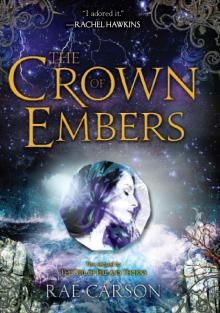 The Crown of Embers
The Crown of Embers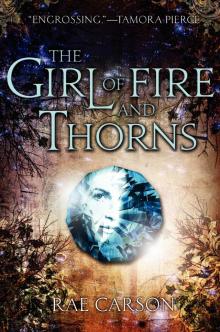 The Girl of Fire and Thorns
The Girl of Fire and Thorns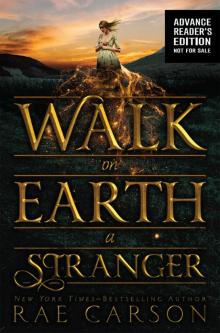 Walk on Earth a Stranger
Walk on Earth a Stranger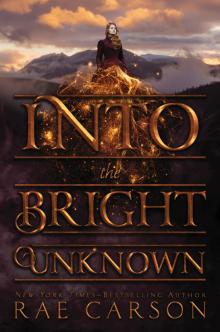 Into the Bright Unknown
Into the Bright Unknown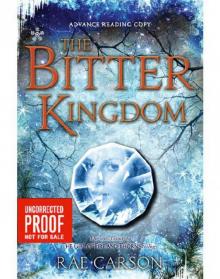 The Bitter Kingdom
The Bitter Kingdom The Rise of Skywalker
The Rise of Skywalker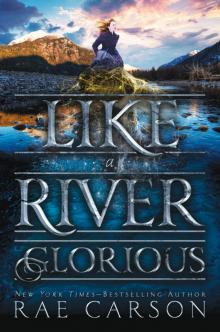 Like a River Glorious
Like a River Glorious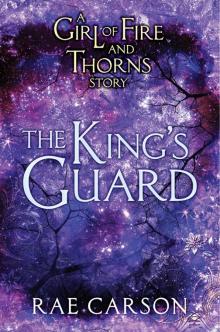 The King's Guard
The King's Guard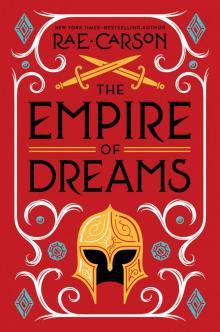 The Empire of Dreams
The Empire of Dreams Most Wanted
Most Wanted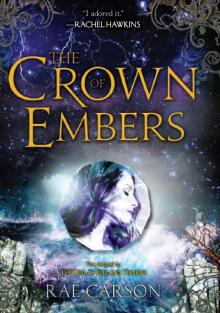 The Crown of Embers fat-2
The Crown of Embers fat-2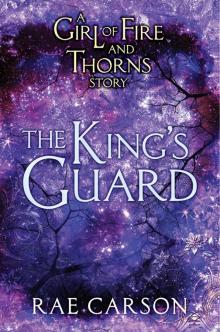 The King's Guard (fire and thorns)
The King's Guard (fire and thorns)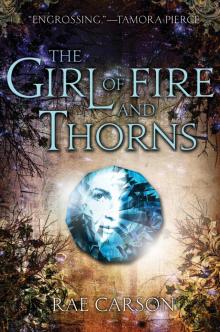 The Girl of Fire and Thorns fat-1
The Girl of Fire and Thorns fat-1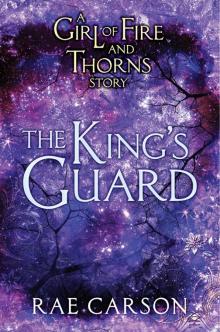 Fire and Thorns 00.7: King's Guard
Fire and Thorns 00.7: King's Guard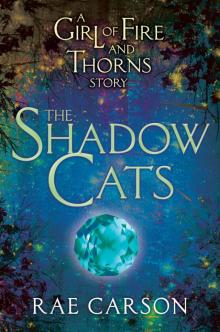 The Shadow Cats (fire and thorns )
The Shadow Cats (fire and thorns )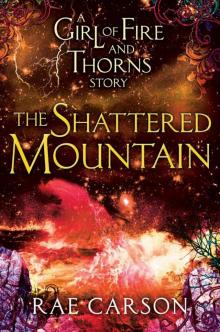 The Shattered Mountain (fire and thorns)
The Shattered Mountain (fire and thorns)